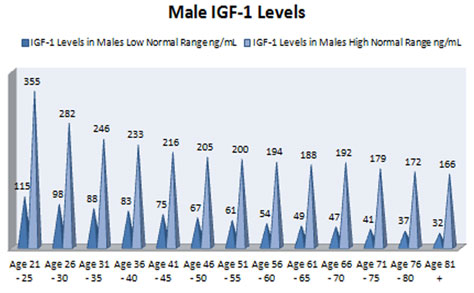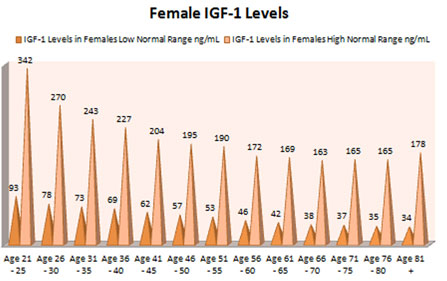Low HGH Levels: What Does It Mean?

Human growth hormone does more than help the body grow during youth; that is why it is essential to preserve the production of this mighty chemical messenger throughout adult life.
HGH continues to build strong muscles and bones, support metabolic and immune system functions, maintain sharp brain functions, and more. When your human growth hormone levels decline, as they naturally do with age, the body will either adjust or it will undergo breakdown in many of the areas that require an adequate supply of HGH.
What causes low HGH levels in adults?
The most likely cause is aging – growth hormone levels naturally start to decline around the age of thirty. In more severe cases, head injury or tumors may be the reason for HGH deficiency.
Low HGH levels can interfere with the ratio of low-density to high-density lipoproteins in cholesterol, but that is only the start of the unwanted changes that can occur in the adult body when human growth hormone secretion does not keep up with our physiological needs of this substance.
Here are some other changes that can occur when HGH levels decline:
| Physical Symptoms of Low HGH Levels in Adults: |
|
What is low growth hormone levels going to do long-term if not caught and corrected?
Adults who have growth hormone deficiency are at a higher risk to develop the following health conditions:
| Medical Concerns Connected to Low HGH Levels in Adults: |
|
Ignoring the signs of adult growth hormone deficiency can put you at risk for more serious issues. That is why immediate action should be taken by contacting a hormone specialist for aging adults when these changes occur.
How You Can Tell if You Have Low HGH Levels
The signs are clearly there when you have low human growth hormone levels. You may notice them on a daily basis, or other people may point them out to you.
Here are some of the signs that will help you tell if you have low HGH levels:
| Warning Signs of Low HGH in Adults: |
|
Unlike diagnostic procedures for other health issues, how to test for low HGH levels is a simple blood test. The hormone specialist will run a complete set of blood panels to ensure that no other reasons for the symptoms or the human growth hormone decline are present. A test that measures insulin growth factor 1 levels is the best way to judge adult growth hormone deficiency as IGF-1 secretion by the liver is in direct proportion to the amount of HGH that organ receives.
What Are Ideal Levels of HGH in Men and Women?
The liver secretes insulin growth factor 1 based on the signals received from HGH input. While human growth hormone enters and exits the bloodstream at a rapid pace, making it difficult to measure, IGF-1 levels remain relatively constant, making them the better indicator of HGH deficiency.
Here is the chart for IGF-1 levels in males:

Here is the chart for IGF-1 levels in females:

Once you get down to the lower end of the spectrum, it is time to examine the impact that low HGH levels are having on your well-being.
Steps You Can Take to Correct and Reverse Low HGH
While getting any diagnosis from a doctor may seem daunting, a determination of low HGH levels is not the end of the world. In fact, this condition is easily treated and reversed with human growth hormone therapy.
HGH is a prescription only medication that comes in the form of a daily injection. You will be able to administer this treatment at home. Do not attempt to self-diagnose and treat HGH deficiency. Only a hormone specialist can determine who has low HGH and the proper dosage to treat and restore balance to human growth hormone levels in the body.
The HGH deficiency diagnosis requires the following simple steps:
| Steps to Complete for HGH Deficiency Diagnosis and Treatment: |
|
At HT Medical Center, our hormone specialists provide confidential consultations by phone, convenient local diagnostic labs, and affordable treatment options for a variety of hormonal imbalances and deficiencies. Contact us today for a free consultation.

















